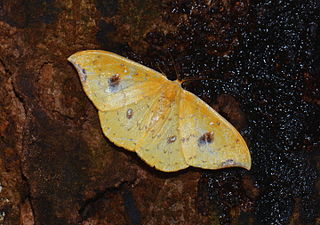
Drepaninae are by far the largest subfamily of the Drepanidae moths. While it is usually split into two tribes, Drepanini and Oretini, its internal systematics and phylogeny are not well resolved.

Tridrepana is a genus of moths belonging to the subfamily Drepaninae.

Tridrepana flava is a moth of the family Drepanidae. It is found in the north-eastern parts of the Himalaya, China, Taiwan, Sundaland, and Sulawesi.

Tridrepana arikana is a moth in the family Drepanidae first described by Shōnen Matsumura in 1921. It is found in China, India and Taiwan.

Tridrepana unispina is a moth in the family Drepanidae. It is found in China, Japan and Taiwan.
Tridrepana bicuspidata is a moth in the family Drepanidae. It was first described by Song, Xue and Han in 2011. It is found in Hainan, China.
Tridrepana subadelpha is a moth in the family Drepanidae. It was described by Song, Xue and Han in 2011. It is found in Yunnan, China.
Tridrepana argentistriga is a moth in the family Drepanidae. It was described by Warren in 1896. It is found in Malaysia, Singapore, Indonesia, Myanmar and Hainan, China.
Tridrepana crocea is a moth in the family Drepanidae. It was described by John Henry Leech in 1889. It is found in China, Japan and Korea.
Tridrepana finita is a moth in the family Drepanidae. It was described by Watson in 1957. It is found in China.
Tridrepana fulva is a moth in the family Drepanidae. It was described by George Hampson in 1893. It is found in Tibet in China, Sikkim in India and Nepal.

Tridrepana fulvata is a moth in the family Drepanidae. It was described by Snellen in 1876. It is found in China, India, Myanmar, Malaysia and Indonesia.
Tridrepana marginata is a moth in the family Drepanidae. It was described by Watson in 1957. It is found in Yunnan, China.
Tridrepana rubromarginata is a moth in the family Drepanidae. It was described by John Henry Leech in 1898. It is found in China, India, Bhutan and Nepal.
Tridrepana thermopasta is a moth in the family Drepanidae. It was described by George Hampson in 1914. It is found in south-western China.
Tridrepana sadana is a moth in the family Drepanidae. It was described by Frederic Moore in 1865. It is found in China, India, Nepal and Myanmar.
Tridrepana hypha is a moth in the family Drepanidae. It was described by Hong-Fu Chu and Lin-Yao Wang in 1988. It is found in Yunnan, China.
Tridrepana hainana is a moth in the family Drepanidae. It was described by Hong-Fu Chu and Lin-Yao Wang in 1988. It is found in Hainan, China.
Tridrepana aequinota is a moth in the family Drepanidae. It was described by Allan Watson in 1957. It is found on Buru in Indonesia.
Tridrepana olivacea is a moth in the family Drepanidae. It was described by Warren in 1922. It is found in New Guinea, extending to Goodenough Island and the Bismarck Archipelago.





